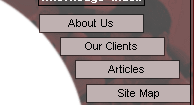Every year, 30,000 Japanese workers die from "karoshi" -- they work themselves
to death, according to Entrepreneur magazine. No such epidemic exists is the U.S.
yet, but the medical journal, Annals of Internal Medicine, recently reported that
24 percent of workers surveyed suffered fatigue for periods longer than two weeks.
Job stress was high on the list of causes for this fatigue. In fact, the United
Nations' International Labor Organization indicates that 75 percent of American
workers consider their jobs stressful.
Much of this stress results from the global competition and economic conditions that have caused reductions in force nearly everywhere in American business. Whether it's called downsizing, rightsizing, pancaking, or organizational flattening, fewer people are now having to do what previously had been accomplished by larger staffs. Employees are having to comply with greatly increased demands in terms of both quantity and quality. The trend today is to hire fewer than adequate staff and work it to the max.
And the stress isn't limited to any one level of employee. Line operations people now have more responsibilities and must produce more. Managers, who used to supervise only eight or nine workers are now managing twice or three times that many. The resulting stress is causing burnout, the symptoms of which include apathy, lack of energy, irritability, errors, complaining, tardiness, absenteeism, illness, decreased motivation and substance abuse. When these symptoms appear, the smart employee and manager will begin to deal with it -- perhaps through an employee assistance program -- or the individual will spiral downward until either a resignation or termination occurs.
Unfortunately, there's very little organizations can do about the global and economic conditions requiring leaner staffs, but there are many actions that can lessen the impact of stress and burnout from "do more with less."
Make sure square pegs are in square holes. Sometimes people pick the wrong jobs
for themselves, and managers do nothing about it. If an extrovert is in an accounting
function, or an introvert is trying to be a salesperson, stress, burnout, and
less than high productivity is likely to result. Also, what may cause stress for
Sally may not be a problem for Sam. So management should make sure everyone is
in the right job. There are many assessment instruments available to help
in this process.
Create worker empowerment. When employees feel they have no control over their work, stress and burnout can occur. This was the finding of a Cornell Medical College study. That doesn't mean management must totally give up control. In fact, worker control over small issues can often minimize burnout, such as prioritizing which of three things must be done first. The concept of self-managed work teams can also provide employee control over work, and free-up management as well.
Provide proper training. When workers don't know the best way to perform a task, anxiety and frustration results, causing stress and ultimately burnout. Employees should always know what to do and how to do it. If instruction hasn't been given, workers should ask for it.
Create a listening management. Nothing reduces stress more than knowing someone is listening and caring about what is being said. Of course, action is part of this equation too, even if it's a failed attempt to deal with a worker problem.
Good as these actions can be, the employee ultimately must deal with his or her own stress and burnout. So, here are some suggestions for creating a more mellow workplace.
- Get to the office 15 minutes earlier every day, thus taking the "rush" out of the morning.
- Don't trust your memory, write everything down.
- Try not to overschedule yourself or your projects. Don't promise what you can't easily deliver.
- Be realistic regarding your standards. Don't set them beyond your reach.
- Maintain your humor. Even a disaster can be funny.
- Plan "B" should always be ready.
- Blow off steam. Get things off your chest.
- Take some quiet time for meditation or deep breathing, particularly when you feel stress building.
- Each evening, prioritize activities for the next day.
- Establish deadlines for yourself, and stick to them.
- Before making or taking a phone call, ask yourself, "Is this call really necessary?"
- Eliminate or deflect drop-in visitors that waste your time.
- Try to avoid rush hour by changing your work schedule.
- Ask yourself if a job can be delegated to someone else.
- Don't always say "yes" to tasks thrown your way.
- Decide if a meeting is really necessary. Are there alternate ways to distribute or collect information?
- Try to see the other person's point of view. Listen and gain insight.
- Stay positive. Focus on the resources you have, instead of those you lack.
With individual awareness of workplace stress and how to control it, employees at all levels of organizations can be healthier, happier and more productive -- even in these lean and mean times.

